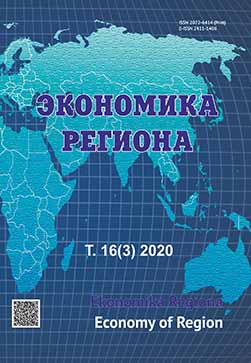Численное исследование зависимости структуры расходов домохозяйств от уровня их доходов в контексте концепции самосохранительного поведения
Dependence of Spending Patterns of Households on their Income in the Context of Health-Related Behaviour: Numerical Study
Author(s): Andrey Gennadievich Shelomentsev, Ksenia Sergeevna GoncharovaSubject(s): Economy
Published by: Институт экономики Уральского отделения Российской академии наук
Keywords: health-related behaviour; income inequality; household income; household expenditures; inequalities in health care; reforming the Russian health care system; availability of medical services
Summary/Abstract: The academic community has been actively discussing and assessing the results of the reform of the Russian healthcare system, which began in the early 2000s. This study considers the results of the reform from the perspective of a concept of health-related behaviour. The paper determines the behaviour patterns of household members concerning personal expenditures on medical goods and services, depending on their monetary income and spending pattern. The main research method was an econometric (correlation and regression) analysis of time series. As a result, we discovered that household income dynamics significantly influence expenditures on medical goods and hygiene items (that vary according to the household income). Moreover, household expenditures on health care depend on its spending on food products. We conclude that, firstly, in 2005–2019, Russia has been showing a steady growth of paid medical services (in total medical care), which are available to less than half of the households. Secondly, health-related behaviour of different groups of households divided by income level significantly changes depending on the income dynamics and spending pattern. Thirdly, an increase in income decreases expenditures on medical services and goods, as well as in an increase in expenditures on health-improvement (preventive) services. We have revealed that spending on food products on average determines 55.9 % of a change in expenditures on medical services. Simultaneously, in the households’ budgets, a 1 % increase in food expenditures displaces 2 % of expenditures on health-improvement services. The obtained results extend the understanding of the features of health-related behaviour that is defined by households’ income, as well as by the spending pattern on food, medical goods and services. Public authorities can consider the revealed features of health-related behaviour of different groups of households divided by income when developing and improving the socio-economic policy in the field of health care.
Journal: Экономика региона
- Issue Year: 16/2020
- Issue No: 3
- Page Range: 791-806
- Page Count: 16
- Language: Russian

